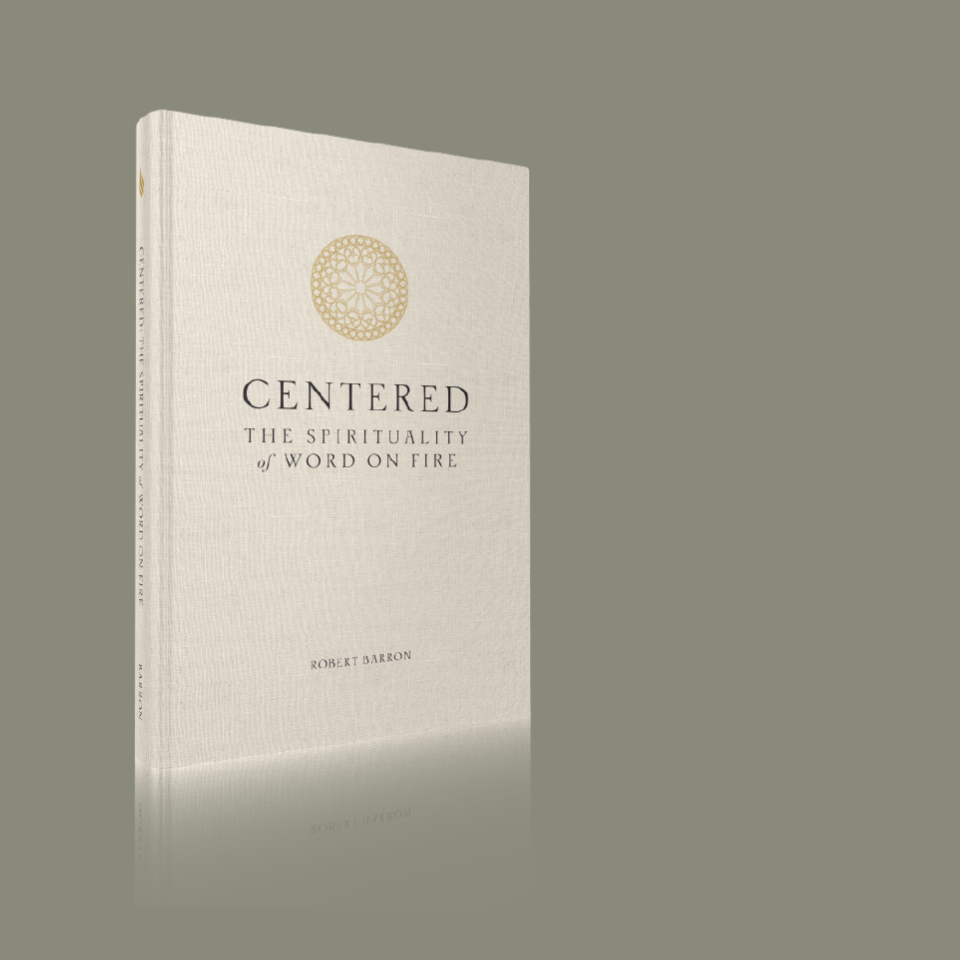Below is Jared Zimmerer’s introduction to Bishop Barron’s new book, Centered: The Spirituality of Word on Fire. Learn more about the book here.
One of the highlights of my life was meeting with the late Cardinal Francis George. Before he passed away, he came to the Word on Fire office in Chicago and met with several people on staff. I was invited by Bishop Barron to join the meeting, even though it was still a few years before I officially joined Word on Fire.
I remember Cardinal George asking the very serious question, “Where are the movements in the Church today? Where are the movements that will respond to the spiritual and existential problems of our time?” He was challenging Word on Fire to take its mission to prayer—and through his inspiration, the ministry gave rise to the Word on Fire Institute, a teaching arm designed to form and connect evangelists around the world.
It is the beginning of the answer to Cardinal George’s call, a response to the most pressing missionary challenge of our time: evangelizing the unaffiliated.
The Catechism of the Catholic Church points out that throughout the Church’s history, numerous spiritualities have emerged from individual men and women, whose witness to God’s love became so compelling that their followers began to share in the same spirit. It continues by stating that a “distinct spirituality can also arise at the point of convergence of liturgical and theological currents, bearing witness to the integration of the faith into a particular human environment and its history.”
To put this in Balthasarian terms, in the providence of the theodrama, certain charisms and missions arise to invite people into the divine life. The life and work of Bishop Robert Barron is one such charism, which finds its life in the theological and liturgical current of the Second Vatican Council as properly understood by St. John Paul II, a mission and spirituality that is evangelical to its very core. His spiritual charism is focused on the existential peripheries of our time, combining the best of the theological, philosophical, and mystical traditions of great thinkers and saints.
Centered: The Spirituality of Word on Fire was created as a foundational tool for both the Institute and the broader Word on Fire movement. Its purpose is to help evangelists better understand the spiritual and theological ethos of Word on Fire. You will notice that the contents of this book are aligned with the Eight Principles of Word on Fire.
These principles are: unwavering Christocentrism; evangelization of the culture; special commitment to the new media; rooted in the Mystical Body; leading with beauty; affirmative orthodoxy; collaborative apostolate; and grounding in the Eucharist. These pillars are the foundation of every initiative at Word on Fire and will continue shaping its evangelists desiring to better reach the modern world. The beauty of this book is that through the words of our spiritual founder, we can come to contemplate how we can embody these principles ourselves.
The first principle is of significant importance in regard to the spirituality offered by this book. Bishop Barron’s first path to holiness is entitled “Finding the Center” in which we revolve the entirety of our being; our relationships, our work, our struggles, our evangelical efforts, around Christ so that we aim each and every aspect to and with the vision of him. The entire mission of the Institute is centered on fulfilling Christ’s great call to invite others to participate in the divine life he offers, the life that has changed each of us.
You may also notice that this book is arranged in a blueprint similar to the catechumenate, the process of initiation focused on revelation and the history, beliefs, and practices of the Catholic Church. As the Catechism also states, “There is an organic connection between our spiritual life and the dogmas.” The catechumenate takes an individual through a journey of discovery, illumination, and ultimately acceptance of the invitation to share in the divine life of Jesus Christ in the sacraments of the Church.
In sharing the life of Christ, we must be emboldened to go out; the entire process is teleologically bound to the missionary call of the Gospel. In a way, Bishop Barron is leading his spiritual children through that same process in this book.
Take Centered with you to prayer. Reflect on the ways Bishop Barron articulates the truths of Catholicism and allow them to shape your own articulation. Contemplate the ways in which this expression of faith can mold you in the image of Jesus Christ. Consider it a roadmap by which the ethos and spirituality of Bishop Barron can guide your own daily life of evangelization.
Too often we separate our spiritual lives from the life of evangelization. This book will integrate the two.
